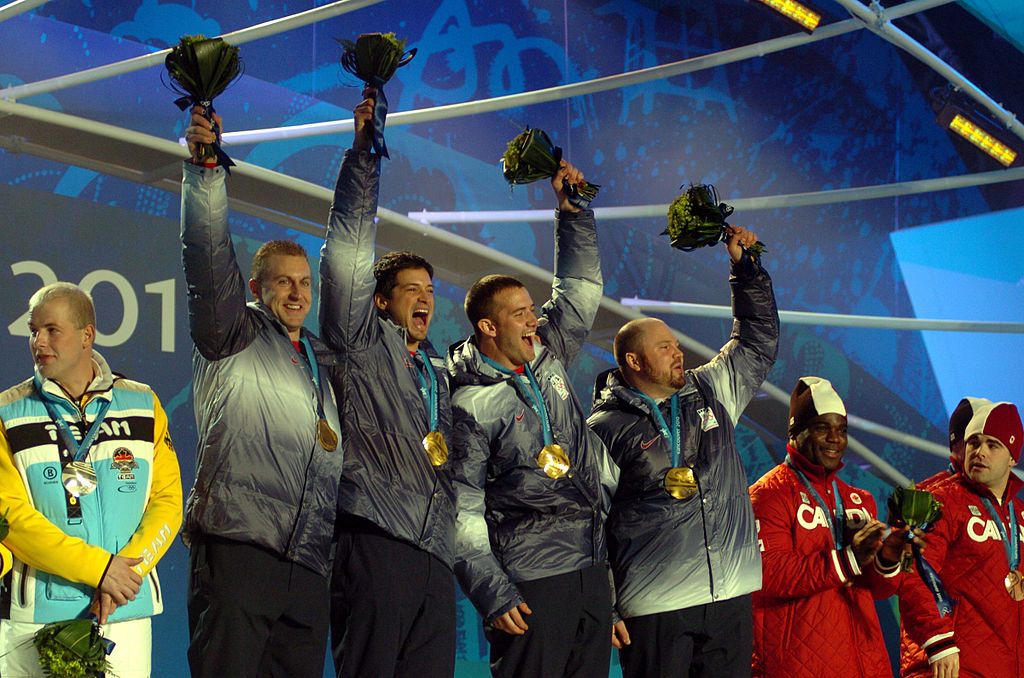
It takes an abundance of power, skill, and courage to simply get a bobsled to the end of the track at 90+ miles an hour without crashing. But at the pinnacle of the sport, an inch or two either way can be the difference between winning an Olympic medal and finishing at the bottom of the standings. How can an athlete make timely decisions as they hurtle down the track? What drives them to put in total effort throughout a four-year Olympic cycle? How do they focus while piloting a metal rocket down an icy slope? We put these questions to bobsledder Steve Mesler, who won gold for Team USA in the four-man bobsled at the 2010 Winter Olympics and now leads the education non-profit Classroom Champions.
What does it mean to have an Olympian mindset?
Having an Olympian mindset means that the Olympics are today, they're tomorrow, they were last Monday, and they were last November. Because you're living in a world where everything you do today is going to affect four years from now, three years from now, next year, or whenever the actual Olympic Games are. So you wake up and approach every day as if the Olympics are right now.
That’s reflected in everything you do. When I knew I had to get up at 7 AM, I made sure I was in bed by no later than 11 PM so I got enough sleep. If I ate an extra egg, that was six more grams of protein to help me get stronger. And if I did one more rep in a set, I was going to get a little bit better. Just like the US Olympic Committee slogan said a few years ago, “It's not every four years. It's every day.”
What mental skills were most important for you during the buildup to the Winter Olympics?
I worked with a mental coach named Ken Baum the year before the Vancouver Games because I was having a really hard time focusing on a lot of things. I had some relationship issues. At that point I had won 30 to 35 World Cup medals. And I really was having difficulty caring about more World Cup races. Because the only thing I cared about then was the Olympic Games. I thought, “I have won plenty of World Cup medals. We won a World Championship the year before.” Going into my last year, I think a big part of the mental challenge for me was answering the question, “How do you focus when you don't want to?"
Because when you put your hands on a bobsled, if you're not 100% focused on what you're doing, you could kill yourself. You could hurt yourself on the push. You can mess up on your way in. Or if something happens on the way down the hill, the price is the highest. So finding a way to focus as you work through things is a big deal. Ken taught me to come up with a phrase I could say to myself repeatedly, whether I was getting into a squat rack or putting my hands behind the sled.
What exactly would you say to yourself in those situations?
I had a very specific mantra for the bobsled track. It was along the lines of the simplest technique cues: “Drop your knees, focus, explode through.” All the other things happen pretty much automatically in a sport like that. So you're just thinking about really big simple cues. Getting into the squat rack, I am somebody who likes to win. I think that was a big psychological change I made as a pro athlete. In college, I was really trying to protect myself against losing and I was hurt most of my career. Then I had to have a significant mental shift when I left University of Florida to go and do what I did.
I learned how to win as opposed to trying not to lose, which is a huge shift in mindset for an athlete. Getting in the squat rack as a bobsledder, I would actually think of the Germans, particularly Kevin Kuske, who is a friend, but I wanted to do nothing more than beat him. Because I knew if I could beat him, we were going to win the gold medal. So for me when getting in the squat rack, it was about knowing that the other guys were out there working just as hard. I wanted to make sure that I was working harder than them.
Earlier you mentioned that a lof of things have to happen automatically on the bobsled track. Can you explain a bit more about your use of fast and slow thinking in that situation?
For me, it always came back to the simple cues. You can’t possibly think of all the things that happen very quickly, so you must have enough repetition to let those things happen automatically. To slow things down a bit, I thought about the big things, like dropping my knees. That would happen when I’d push the sled. It was all about focusing on the large motions that I actually had control over. And knowing that if I could steer myself with them, then all of the little motions – if I practiced them enough – would just occur on their own.
I started spending every summer in Calgary because my coach Stu McMillan was there and there's an ice house. The difficult thing on a bobsled track is that you only get two pushes a day during the season. So you're maybe getting, as a push athlete, a total of eight reps a week. That's it. I'm not a huge fan of the 10,000 hours theory, but if you were trying to accumulate that much practice, you couldn’t do it with only six to eight pushes a week. So we'd go into the ice house and get 10 or 12 pushes in a session, several days a week.
Go for Gold
Want to develop an Olympian’s mindset like Steve? Download the Champion’s Mind app for your Apple or Android phone now.
If you’re a coach, get your team set for the podium with a team license, which we’re discounting for a limited time.
